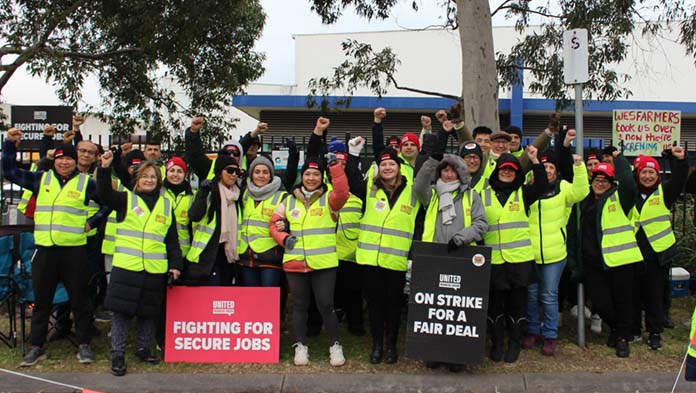After four weeks of strike action, United Workers Union members at Australian Pharmaceutical Industries in Melbourne have secured an immediate 7 per cent cost-of-living pay rise, better than official inflation.
The 190 workers also won full redundancy benefits for long-term members.
UWU delegate Anna told Solidarity, “Everyone was really happy with the offer, some of the members even cried when they heard the news.”
The four-year agreement includes an up-front pay rise of 7 per cent, followed by rises of 4, 3.5 and 3.5.
Workers also won an $800 COVID appreciation bonus, which will help cover a chunk of the pay lost during the strike.
The improvements to redundancy benefits would see some workers doubling their entitlements to 120 weeks. In addition, API, a subsidiary of Wesfarmers, agreed to pay out accumulated sick pay if workers are made redundant.
The redundancy benefits were important because of the real chance that Wesfarmers may close the warehouse and replace it with an automated site.
The 10 API company casuals who joined the strike will get permanent contracts.
However, agency casuals missed out on pay rises or a pathway to permanency, highlighting how important it is for unions to fight for Same Job, Same Pay protections.
Engaging members
Key to keeping up morale high through four weeks of industrial action were mass meetings held on the picket lines. This ensured that there was transparency in the bargaining process.
Members also supported each other away from the picket through group conversations on WhatsApp.
The confidence shown by UWU members—despite none of them ever having been on strike before—took API management by surprise.
The workforce, which was made up largely of women from various backgrounds and generations were not taken seriously—reflected in API’s initial pay offer of 2 per cent.
Some managers resigned or were moved around in the company as union members escalated their campaign to four weeks of strike action.
Demonstrating resolve
It was the willingness of API workers to continue striking until they won that convinced Wesfarmers management to take their demands seriously.
“We were in the middle of making plans on next steps with the expectation that management would not budge, when word came back that management had conceded 7 per cent and full redundancy benefits,” said Anna.
Workers’ resolve to reject a pay cut was strengthened by Wesfarmers reporting record profits and paying their CEO $8 million a year.
“It’s very clear that every one of these corporations can afford to pay their workers properly, but management won’t take the union seriously unless we show that we really mean it,” said Anna.
By Steven Kwon






